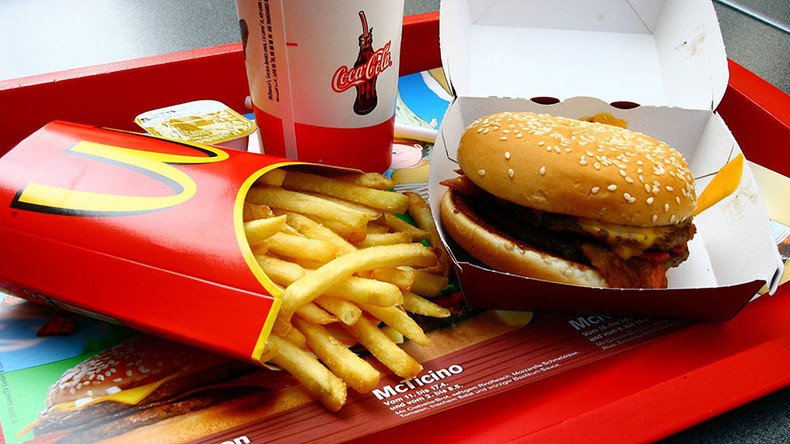Burger wrappers - Another reason to cut down on junk food?

Harmful polyfluorinated compounds, or PFCs, used in fast food wrappers do not biodegrade, and that is a concern, says Graham Peaslee, professor of experimental nuclear physics at Notre Dame University. Why we need to wrap our food is another question.
According to a new study published in the Journal of Environmental Science and Technology, Americans may be exposed to dangerous chemicals when eating fast food wrapped in paper treated with the chemicals which have been linked to cancer and other illnesses. PFCs are also widely used in stain-resistant products, fire-retardant materials, and nonstick cookware.
RT discussed the health risks for it with one of the authors of the study, Graham Peaslee.
RT: The Centers for Disease Control found PFCs in the blood of virtually all Americans. As these PFCs are linked to cancer, thyroid, kidney problems, hypertension, why are PFCs so widely used in consumer products?
Graham Peaslee: These chemicals are very valuable in the sense that they do a function that no other chemical does: they are a surfactant and that allows water and oil to be resisted. If you want oil resistance or water resistance, these are the best chemicals for it. They are all man-made, and they're artificially created to be the best resistance that we have. Why they need to be on our food wrappers - that's another story.
Delicious food, harmful wrapper: U.S. study detects toxic #PFCs in 40 per cent of tested food wrapping material. https://t.co/FeVYDO5ZMP
— EnvironmentalDefence (@envirodefence) February 2, 2017
RT: There are PFC-free food wrappers available. So why aren't they being used instead?
GP: It's one of those things we are not sure why they're in the papers other than that somebody thought it was a good idea that you shouldn’t be able to get grease on pants while you eat fast food. We kind of understand that. The alternative is to wash your pants. But we tend to believe that this class of chemical is very persistent, it is going to the last forever: not only may it get into the food that you're eating and you may eat some of these chemicals which are not going to be toxic in several cases.
But what happens to the wrapper when you throw it away - it gets into the landfill, and these chemicals will degrade and go right through the landfill treatment system and end up in our drinking water. So if you aren't going to eat the wrapper, your grandchildren will, or all the chemicals on it. Because these chemicals do not biodegrade and that's what our real concern was with this paper. We didn't try to point out one chain versus another; all the chains are using them. And there are alternatives that are non-fluorinated which we think should be used - so that's why we’ve published this paper.
RT: In your research, you also found that many consumer items have potentially dangerous chemicals in them. Are the agencies in charge of safeguarding public health, like the United States Environmental Protection Agency (EPA) and the Food and Drug Administration (FDA) doing an adequate job?
GP: They are doing the best they can with limited resources. But their job is not to regulate chemicals. There is no chemical regulation in the US, except for TOSCA. That’s a very interesting regulation; there’s 80,000 chemicals on the market and 62,000 of them were never tested. The newer chemicals are only tested by the manufacturer, not by the FDA.
The statements, views and opinions expressed in this column are solely those of the author and do not necessarily represent those of RT.












